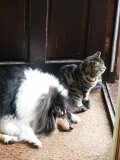
Medical ProblemsCollie Eye Anomaly Collies do have eye problems. Grades 1 and 2 are still bred and shown,
but breeders are making an effort not to breed any affected dog. Right
now it is difficult to do with the high rate of affected and carrier
dogs. CEA is the most common form of eye problem found in the Collie,
both rough and smooth variety. It is also found in the Border Collie,
and the Shetland (Sheltie) Sheepdog. CEA is a simple recessive, as
shown by research, however a cluster of genes control the severity
of CEA in an affected dog and that can complicate diagnosis. There
is no correlation between CEA and sex, coat colour, type of coat (rough
or smooth), or presence of the merling gene. Usually both eyes are
affected, but not necessarily to the same degree. Those dogs with
minor anomaly make fine pets and it is unusual for them to lose their
eyesight.
If a dog is "mildly affected", it is an affected dog and will always pass along CEA to it's puppies. So breeding two "mildly affected" dogs will never result in unaffected, or even carrier puppies. Breeding two apparently normal dogs may result in puppies with CEA if both dogs turn out to be carriers. If a dog ever produces a puppy with CEA, then that dog must be either a carrier or an affected dog itself. Progressive Retinal
Atrophy
(PRA Details)) PRA will result in blindness. A well known and widely used stud dog in the '70s was found to be a carrier and did produce blind puppies. While the breeder now test-breeds all their stock available for stud services, PRA is present in a number of lines. Most reputable breeders who know or suspect that PRA is in their lines do test-breed. Since PRA in Collies is a simple recessive, it has been easier to control than CEA. Nodular Granulomatous
Episclerokeratitis (NGA
Details) (NGE) (Collie Granuloma), NGE is thought
to be an immune mediated disorder in which a cellular proliferation
occurs at the corneal scleral junction. This eventually causes damage
to the cornea. Hip Dysplasia
(HD Details)
Collies have low rates of hip dysplasia. Most breeders do not check or OFA their dogs. Collies and Boston Terriers are about equal in the number of hip dysplasia cases. It is still preferable to have the dogs checked before breeding. Degenerative
Joint Disease (DJD
Details) This causes the bones to "waste" as they form and grow.
|